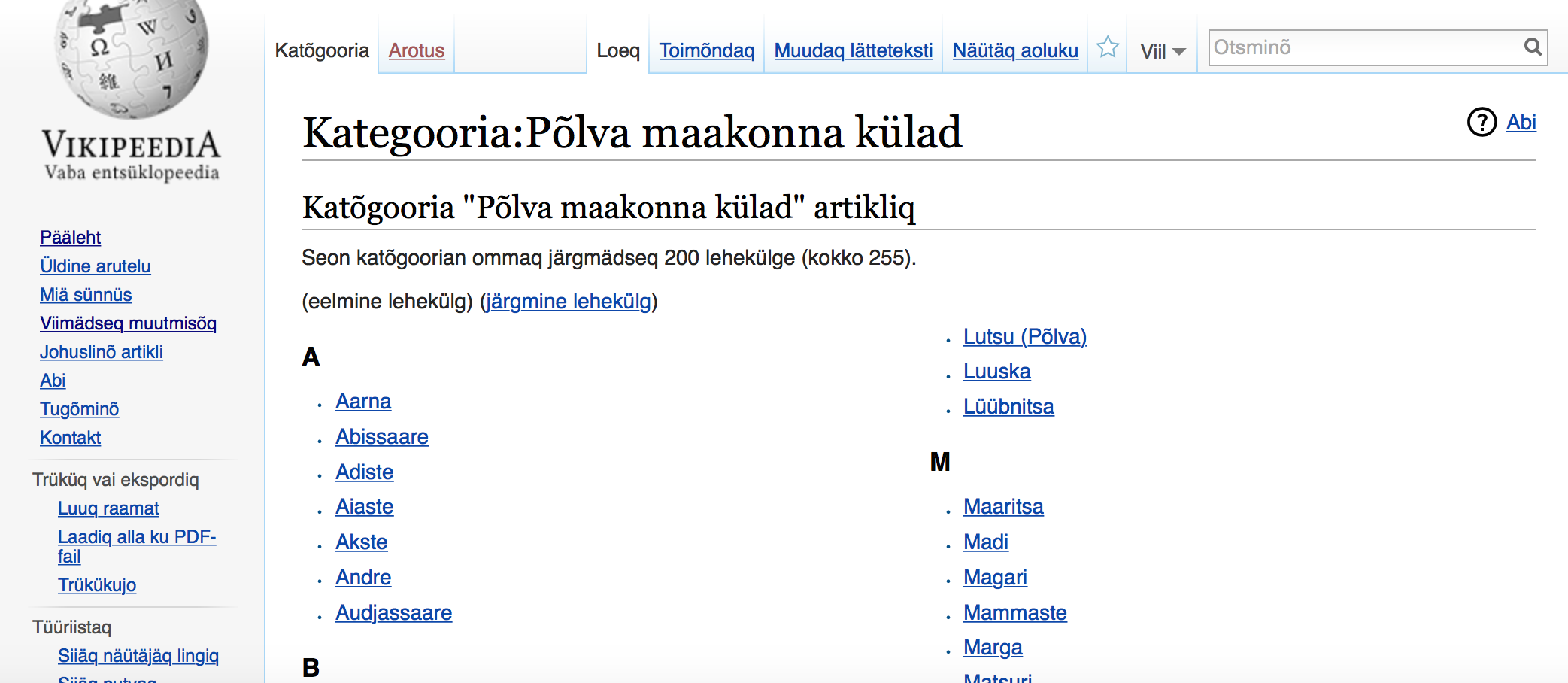Instructions for using Wanca:
Browse
You can browse the links in small Uralic languages by selecting a language you want to see. You can do this by either using the list of language groups or the list of all languages. You can also narrow down the results by selecting a specific domain. Once you select a language, you get a list of sites in that language. You can browse the links of a site one by one, seeing each link's content in the frame on the page. A pdf does, unfortunately, not load into the frame but you can open the document in a new tab. The links are listed under their "current language", which might differ from the automatically identified language if the language has been changed by an expert user. By clicking the name of the site in a link's page, you can see all the links on that site containing text in small Uralic languages. If the site contains links in several languages, you can see each group of links by clicking the language. The grouping as well as the division of languages we use follows those of Ethnologue: Languages of the World and the ISO 639-3 standard.
Search
You can also search for links by clicking the magnifying glass icon in the navigation bar. The searches can only be done to the addresses of the links. The search can, however, contain several words as long as they are consecutive and contain also the possible punctuation marks (for example areena.yle). Since we only provide links to the pages in Finno-Ugric languages we have found in the internet and our database does not contain the actual texts on those pages, it is not possible to make searches in the content.
Vote
By registering to Wanca, you can vote for the current language either being correct or incorrect. You can use the dropdown box from your username, to select not to see the links you have already voted for. With the 'don't know' vote you can also hide links you have already seen.
Report problematic links
If a link does not load or is said not to be available, you can report the link as problematic by clicking the button on the link’s page. We will then take a look at the problematic links and remove them from the list if necessary.
Verify and change languages
After registering, you can apply for expert rights by sending us a message. Please, tell about your interest in Wanca and Uralic languages, about your language skills and your affiliation if any. As en Expert user you will be able to verify the language of a link. Verification counts as a yes vote for the current language. You will also be able to change the language of the links or sites where the automatically identified language is incorrect.
Report missing links or sites
Crawling the whole internet is impossible and, therefore, we have collected links from various domains which we thought might contain pages in small Uralic languages (.ee, .fi, .hu, .lv, .no, .ru, .se) as well as from some link lists. We would be grateful for any links containing text in any small Uralic languages, be it from other domains or otherwise not reached by our web crawler. We will use the new links as starting points of our future crawls. Users with expert rights can add a new link to the database by selecting the option from the dropdown list under their username in the navigation bar. Added links will be considered as 'verified' for the language you have indicated. You can also email any such links to us through our contact form.
Further instructions for voting and verifying:
For the corpus gathering purposes we are basically looking for sites that contain at least one sentence in a relevant language.
If a page includes just a description of a relevant language in another language, vote no for the relevant language. If the page contains just individual words or names in a relevant language, but it is mainly in a not relevant language, vote no for the relevant language. Example of such a no vote would be the Võro description page in Alemannic German Wikipedia:
If the page includes at least one complete sentence in the relevant language, do vote yes for the relevant language. Example of a yes vote would be the examples of Võro in the Czech Wikipedia description of Võro language:
A webpage is usually made up from several different files. We have identified the language of the individual files, but the page that is shown to you is the whole page. The other files included in the pages might be advertisements that are shown to you, for example, because of the location you are using the internet or the cookies stored into your web browser.
Also, if you are logged into a site, for example the Wikipedia, the website might know your prefered language and show some common sections or menus in that language. We are asking you to try to identify the relevant part of the webpage, it should not be that difficult, and vote according to that part of the webpage. An example of an Estonian page with menus in Võro follows:

Problems?
The site is still under construction and problems may arise. Please, let us know of any problems you encounter by sending us a message and we will try to solve those problems. Note that Wanca might sometimes be down for updates. Please, try again later. The server where wanca is situated is, furthermore, down for maintenance on the fourth Thursday of every month between 8 and 10 o'clock in the morning (Eastern European time).